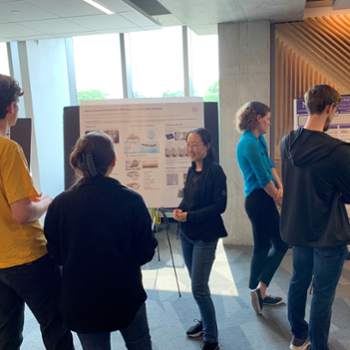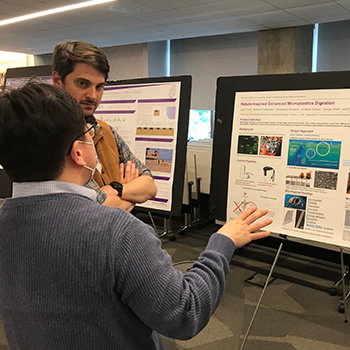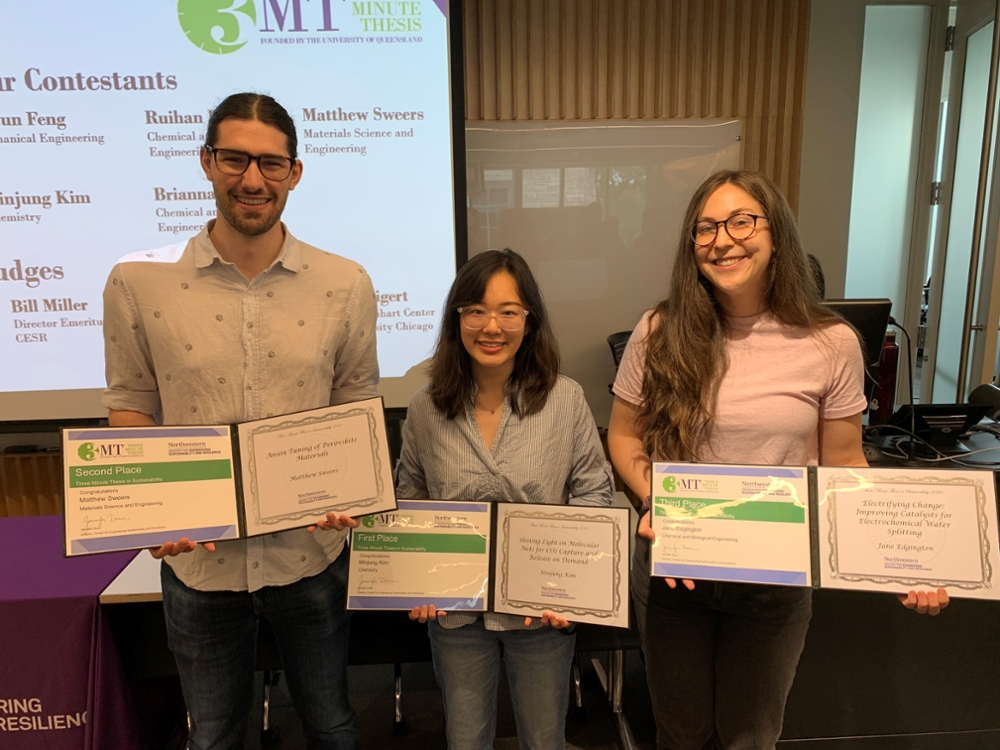2025 Poster Session
Three Minute Thesis Competition

CESR's Annual Poster Session for Research in Sustainability and Resilience Participants: MAY 2025
CESR's 4th Annual Poster Session for Research in Sustainability and Resilience included 14 research posters and a crowd of interested faculty, students, and researchers from across the university. Representatives from our fifth round Seed Grant project teams shared their results alongside labs working on sustainability-related from across the university, with 7 departments representatives.
Posters Presented:AC-Photo-Hall measurement of ambipolar mobility in perovskite photovoltaics, Juncen Li, Stefan Zeiske, Dana Kachman, Samantha Reitz, Edward Sargent, Bin Chen, and Matthew A.Grayson
Advancing Phosphorus Recovery: Optimizing Sponge Nanocomposite Performance for Wastewater Applications, Clare McGillis, Kelly Matuszewski, Yao Ma, Thomas Lippert, Elias Kallon, Emma Shapiro, Aaron Packman, Vinayak Dravid
Approaching sustainability assessments through Anishinaabe Gikendaasowin, Margaret O’Connell, Kathleen Smith, Marvin DeFoe – Shingwe Bines, Mike Wiggins Jr., James Rasmussen, Esteban Chiriboga, Michael Waasegiizhig Price, Kimberly R. Marion Suiseeya, and Jennifer B. Dunn
Beyond Energy Efficiency: Designing Buildings for Health, Comfort, and Productivity, Nan Wang, Hannah Aziz, Seongyeop Woo, and Giorgia Chinazzo
Direct Partial Oxidation of Methane to Methanol at Plasma-Catalyst-Liquid Interfaces, James Ho, Matthew Hershey, Wesley Beck, and Dayne Swearer
Increasing Efficiency in Fluorine-Free Li-Metal Batteries using Sterically Hindered Electrolytes, Cecelia Barr, Sapna Ramesh, and Jeffrey Lopez
Inside Tile Drains: The soil particulate organic carbon and microbial communities of agricultural drainage networks, Katherine DuRussel, Neal E. Blair, George F. Wells, Erin Bauer, Hayden Wennerdahl, and James M. Haken
Material Flows of Synthetic Biology-Enabled High-Volume Chemicals in the United States Background, Madeline Joseph and Jennifer B. Dunn
Metal Organic Framework Transformations Beyond Linker Arrangement: Bimetallic Node Reconfiguration and its Role in CO Oxidation, Haley Wellman and Omar Farha
PHB Production from CO2: Probing Use Cases For Electrolyzer-Derived Carbon, Kevin Fitzgerald, Rawia Marafi, and Keith Tyo
Semi-Dry Roll-to-Roll Printing of Electrodes for Lithium-Ion Batteries, Zhiyuan Li and Tao Sun
Circular processing of polyesters through biological production and biopolymer grafting, Norah Xinyu Chen, Sara Branovsky, Cécile Chazot, and Ludmilla Aristilde
Upcycling rubber waste through dynamic bond incorporation, Nina Georgieva, Daniel R. Hart. and Julia Kalow
Modeling Degradation in Lithium Metal Batteries Using a Quantitative Electrochemical Phase Field Framework, Jin Zhang and Peter Voorhees
CESR's Annual Poster Session for Research in Sustainability and Resilience Participants: MAY 2024
CESR's 3rd Annual Poster Session for Research in Sustainability and Resilience was our largest so far, featuring 21 research posters and a crowd of interested faculty, students, and researchers. Representatives from our fourth round Seed Grant project teams shared their work with the CESR community, alongside several Seed Grant teams from other funding cycles and a number of student and lab groups from across the school.
Posters Presented:
 Photonic voltmeter to track pollutants transport in the environment, Amani Alghamdi and Franz Geiger
Photonic voltmeter to track pollutants transport in the environment, Amani Alghamdi and Franz Geiger
Sustainability-First Design Thinking Through a Carbon Readiness Level (CRL) Framework, Amogh Bharadwaj, Hyunbin Lee, Isaac Winoto,and Nivedita Arora
Circular processing of polyesters through biological production and biopolymer grafting, Sara Branovsky, Norah Chen, Eva Durance, Ludmilla Aristilde, and Cécile Chazot
K-12 Workshop: Inspiring Electronics Sustainability Through Laptop Disassembly, Vince Chi, Ben Taalman, Jack Thoene, and Nivedita Arora
Carbon Characterization for Vehicle Routing Problem, Harita Duggirala, Pengxiang Huang, Yoonsung Jeong, Joshua Zhuang, and Nivedita Arora
 Agricultural tile drains as a massive, uncharacterized new environment for microbially-driven C-cycling, Katie DuRussel, George Wells, and Neal Blair
Agricultural tile drains as a massive, uncharacterized new environment for microbially-driven C-cycling, Katie DuRussel, George Wells, and Neal Blair
Understanding Heat Transport Across Grain Boundaries Through High Resolution Imaging and Modeling, Eleonora Isotta, Richmod Odufisan, Shizou Jiang, R Nagahiro, Ruben Bueno Villoro, Alexandra Zevalkink, Junichiro Shiomi, G. Jeffrey Snyder, and Oluwaseyi Balogun
Exploring succulent plants as biodegradable batteries for plant-powered IoT, Kiva Joseph, Qitong Li, Jack Thoene, and Nivedita Arora
Quantifying the Impact of Synthetic Biology Technologies on Industrial Chemical Manufacturing, Madeline Joseph, Jennifer B. Dunn, and Danielle Tullman-Ercek
Sustainable design and fabrication of robots, Taekyoung Kim, David Matthews, Sam Kriegman,and Ryan Truby
A Rapid Low-temperature Method for Direct Recycling of Lithium-Ion Battery Cathodes, Jiyoung Lee, Isha Sura, Dayne Swearer, and Jeffrey Lopez
Application of Exsolution Electrodes to Low-Temperature Electrochemical Cells for Hydrogen Production and Utilization, Ruihan Li, Jakob Reinke, Linsey Seitz, and Scott Barnett
 Theoretical and empirical analysis of generator offers in operating reserve markets: Evidence from ERCOT, Mark Noll, W. Neal Mann, and Todd Levin
Theoretical and empirical analysis of generator offers in operating reserve markets: Evidence from ERCOT, Mark Noll, W. Neal Mann, and Todd Levin
SMARTWATER: Identifying Urban Stream Dynamics, Joaquina Noriega, Aaron I. Packman, Stefan Krause, and David M. Hannah
Fabricating and characterizing low-resistance contacts to conducting polymer composites, Claire C. Onsager, Lev Rovinsky, Can C. Aygen, Shira Cohen, Matthew A. Grayson, and Noa Lachman
Manganese-Oxide Adsorbents for Critical Metal Recovery, Madison Polinski, Benjamin Shindel, Jean-François Gaillard, and Vinayak Dravid
Modeling of Bioclogging of Soil Aquifer Treatment (SAT) Systems, Edwin Saavedra Cifuentes, Aaron I. Packman, and Alex Furman
Novel Adsorbents for Removal of Emerging Organic Contaminants from Wastewater, Emma Shapiro, Zhi-Wei Lin, Will Dichtel, and Aaron I. Packman
 Differentiated Recovery of Phosphates and Metals with the PEARL Membrane, Benjamin Shindel, Kelly Matuszewski, and Vinayak Dravid
Differentiated Recovery of Phosphates and Metals with the PEARL Membrane, Benjamin Shindel, Kelly Matuszewski, and Vinayak Dravid
Sustainability-oriented Material Selection and Memory System Design for Warehouse Robots, Isaac Sun, Welldone Matanga, David Shen, and Nivedita Arora
Exploring Neuromorphic Computing with Magnetic Tunnel Junction, Yanni Wilcox, Nicole Wojcik, Pedram Khalili, and Nivedita Arora
CESR's Annual Poster Session for Research in Sustainability and Resilience Participants: JUNE 2023
CESR's Second Annual Poster Session for Research in Sustainability and Resilience brought our research community together on the afternoon of June 6th, 2023 to showcase a year of research advances. Representatives of our second- and third-year Seed Grant teams updated their colleagues on the state of their projects, alongside a selection of additional posters.
Posters Presented:
Critical Minerals Mining: Impacts on Sustainability and Sovereignty, Margaret O'Connell, Jenna Trost, Yilun Zhou, Abbie Draheim, Natalia Gutiérrez Rodríguez, and Jennifer Dunn
Effects of Electricity Market Design on the Composition of Low Carbon Power Grid, Mark Noll, Jongwhan Kwon, and Audun Botterud
Examining Resilience to Overlapping Hazards, Gretchen Bella, Emőke-Ágnes Horvát, and Amanda Stathopoulos
FSVPy: A python-based package for fluorescent streak velocimetry (FSV), Pamud Akalanka Bethmage, Han Lin, Brendan C. Blackwell, Michelle M. Driscoll, and Jeffrey J. Richards
Integration of Remote Sensing and Geomechanical Models for Natural Hazard Prediction, Benigno Alonzo Jr, Xiang Li, and Giuseppe Buscarnera
Manganese-Based Sponge Coatings for Critical Metals Recovery, Benjamin Shindel, Samuel Lombardo, Madison Polinski, Kelly Matuszewski, Vinayak Dravid, and Jean-François Gaillard
Nature-Inspired Enhanced Microplastics Capture and Digestion, Leyun Feng, Chloe Ho, Kyoo-Chul Park, and George Wells
SEACRET: Strengthening Electrochemically Any Coastal Region without Environmental Threats, Andony Landivar Macias, Steven D. Jacobsen, and Alessandro Rotta Loria
Single-Particle Tracking in Covalent Adaptable Networks, Christopher Rademacher, Muzhou Wang, Julia Kalow, and Viraj Kirinda
Stress Relaxation in Reprocessable Covalent Adaptable Networks, Kevin Considine, Claire Onsager, Mohammed bin Rusayyis, John Torkelson, and Matthew Grayson
Understanding Heat Transport Across Grain Boundaries Through High Resolution Imaging and Modeling, Eleonora Isotta, Shizou Jiang, Alexandra Zevalkink, G. Jeffrey Snyder, and Oluwaseyi Balogun
CESR's Annual Poster Session for Research in Sustainability and Resilience Participants: MAY 2022

CESR held its inaugural Poster Session for Research in Sustainability and Resilience on May 17th, bringing together representatives of all 13 Seed Grant teams and a large crowd of interested students and faculty from around the university for lively research discussions.
Posters presented:
Multi-scale analysis of electrocatalytic reactor processes using a combined experimental and modeling approach, Linsey Seitz, Niall Mangan, Brianna Ruggiero, and Jithin George
Nature-Inspired Enhanced Microplastics Digestion- Capture and Biodegradation by Flexible Fibers with Attached Microorganisms, Kyoo-Chul Park, George Wells, and Leyun Feng
Sensing Material Properties as Nature Intends, James Hambleton, Simge Küçükyavuz, and Anastasia Nally
Towards a Circular Bioeconomy: Recovery of Nitrogen as a Value-Added Product from Farm Animal Manure, George Wells, Keith Tyo, Rashmi Raj, and McKenna Farmer
What is the air quality and CO2 impact of an electric vehicle transition?, Adilson Motter, Daniel Abrams, and Daniel Horton
Community Vulnerability Index: Examining resilience to overlapping hazards, Amanda Stathopoulos, Emőke-Ágnes Horvát, and Elisa Borowski
Connecting microscopic reprocessing to macroscopic properties for a circular plastics economy, Muzhou Wang, Jeffrey Richards, and Julia Kalow
Unified modeling of flowside initiation and runout, Giuseppe Buscarnera, Petia Vlahovska, and Ming Yang
ViSER (VIsualizing Suspension Electro-Rheology): a new tool for interrogating microstructure in fast-flowing suspensions, Jeffrey Richards, Michelle Driscoll, Brendan Blackwell, and Han Lin
Towards Engineering Metamaterials for Sustainable Energy Solutions: Local Thermal Properties of Grain Boundaries in Polycrystalline Materials, Oluwaseyi Balogun, G. Jeffrey Snyder, and Baojie Lu
Towards Sustainable and Eco-Friendly Recovery of Critical Metals from Waste, Benjamin Shindel, Samuel Lombardo, Vinayak Dravid, and Jean-François Gaillard
Microscopic Model of Stress Relaxation in Biopolymers and Composites, Can Aygen, Jiajun Luo, and Matthew A. Grayson
Characterization Standard for Stress Relaxation in Reprocessable Covalent Adaptable Networks, Claire Onsager, Can Aygen, Mohammed Bin Rusayyis, Lev Rovinsky, Noa Lachman, John Torkelson, Matthew A. Grayson
Relaxations Limited by Non-Gaussian Diffusion, Alain Kangabire, Kevin Considine, Can Aygen, Matthew A. Grayson
Life cycle assessment of emerging sustainable polymer processes, Sabyasachi Das
Reprocessable Polythiourethane dynamic networks, Logan Fenimore
Putting carbon markets to work on the path to net zero, Krupal Jawanjal
Three Minute Thesis Competition
CESR will not be organizing a Three Minute Thesis competition in 2025. Please share your research as part of our Poster Session on May 19th!
CESR Three Minute Thesis Competition 2024
Seven PhD students submitted video entries to CESR's Second Three Minute Thesis Competition in 2024, with winners announced May 30th. Thank to all of our contestants, as well as our judge Dr. Steven Carr, and our presenter Dr. Linsey Seitz.
1st Place: Grace Xiong, "Non-stoichiometry in Cubic, Superprotonic Solid Acid Electrolytes"
2nd Place: Joaquina Noreiga, "How Does Urban Runoff Impact River Networks?"
3rd Place: Kevin Fitzgerald, "Cyanophycin: A Natural Solution to Nitrogen Waste"

All contest entries can be viewed below.
2023 CESR Three Minute Thesis Competition
Contest Entries
All seven of our Three Minute Thesis contest entries for 2024 can be viewed below.
Non-stoichiometry in Cubic, Superprotonic Solid Acid Electrolytes
Grace Xiong, Materials Science and Engineering
How Does Urban Runoff Impact River Networks?
Joaquina Noreiga, Civil and Environmental Engineering
Cyanophycin: A Natural Solution to Nitrogen Waste
Kevin Fitzgerald, Chemical and Biological Engineering
Reimaging the Nitrogen Circular Economy: A Holistic Comparative Framework for Nitrogen Recovery Technologies
Chayse Lavallais, Chemical and Biological Engineering
Are Topological Insulators Promising Thermoelectrics?
Michael Toriyama, Materials Science and Engineering
Machine learning molecular mixture property for battery electrolyte design
Hengrui Zhang, Mechanical Engineering
Consequential Life Cycle Analysis on Mineral Mining
Yilun Zhou, Chemical and Biological Engineering
Rules
- Presentations are limited to 3 minutes and competitors exceeding 3 minutes are disqualified.
- Presentations are considered to have commenced when a presenter starts their presentation through speech (timing does not include the 3MT title slide and commences from when the competitor starts speaking, not the start of the video).
- Videos must meet the following criteria:
- Filmed on the horizontal;
- Filmed on a plain background;
- Filmed from a static position;
- Filmed from one camera angle;
- Contain a 3MT title slide;
- Contain a 3MT PowerPoint slide (top right corner/right side/cut to)
- A single static slide is permitted in the presentation. This can be visible continuously, or ‘cut to’ for a maximum of 1 minute.
- The 3-minute audio must be continuous – no sound edits or breaks.
- No additional props (e.g., costumes, musical instruments, laboratory equipment and animated backgrounds) are permitted within the recording.
- Presentations are to be spoken word (e.g., no poems, raps or songs).
- No additional electronic media (e.g., sound and video files) are permitted within the video recording.
- The decision of the adjudicating panel is final.
- Please note: competitors *are not* judged on video/ recording quality or editing capabilities. Judging will focus on the presentation, ability to communicate research to a non-specialist audience and the 3MT PowerPoint slide.
Judges and Judging Criteria
Comprehension and Content
- Presentation provided clear background and significance to the research question
- Presentation clearly described the research strategy/design and the results/findings of the research
- Presentation clearly described the conclusions, outcomes and impact of the research
Engagement and Communication
- The oration was delivered clearly, and the language was appropriate for a non-specialist audience
- The PowerPoint slide was well-defined and enhanced the presentation
- The presenter conveyed enthusiasm for their research and captured and maintained the audience’s attention
Three Minute Thesis
The Three Minute Thesis (3MT®) is an academic research communication competition developed by The University of Queensland (UQ), Australia. Inspired by the 3 minute egg timers Queensland residents used to time their showers during a drought in 2008, the competition encourages students to consider their own research in new ways, while building new opportunities for dialogue and collaboration between individuals and working groups.
At present, 3 Minute Thesis competitions have been held in more than 900 universities across more than 85 countries.
CESR Three Minute Thesis Competition 2023
CESR hosted its inaugural Three Minute Thesis competition in 2023, with the winners announced at the poster session on June 6th.
1st Place: Minjung Kim, "Shining Light on Molecular Nets for CO2 Capture and Release on Demand"
2nd Place: Matthew Sweers, "Anion Tuning of Perovskite Materials"
3rd Place: Jane Edgington, "Electrifying Change: Improving Catalysts for Electrochemical Water Splitting"

(Left to Right: Sweers, Kim, and Edgington)
Thank you to all of our participants for entering! All of their presentations are available to watch below.
Shining Light on Molecular Nets for CO2 Capture and Release on Demand
Minjung Kim, Chemistry
Anion Tuning of Perovskite Materials
Matthew Sweers, Materials Science and Engineering
Electrifying Change: Improving Catalysts for Electrochemical Water Splitting
Jane Edgington, Chemical and Biological Engineering
Catalyst Corrosion for Water Electrolysis
Ruihan Li, Chemical and Biological Engineering
Nature-Inspired Enhanced Microplastics Filters
Leyun Feng, Mechanical Engineering
Sustainable Production of Hydrogen Peroxide Using Renewable Electricity
Brianna Ruggiero, Chemical and Biological Engineering
Catalyzing a Sustainable Future with Electrochemistry
Adrien Deberghes, Chemical and Biological Engineering
Thank you to our four judges:
Cécile Chazot, Assistant Professor of Materials Science and Engineering and Julia Weertman Professor in Materials Science and Engineering, Northwestern University
William Miller, CESR Founding Director
Lauren Valentino, Environmental Engineer, Argonne National Laboratory
Karen Weigert, Director, Baumhart Center, Loyola University Chicago

